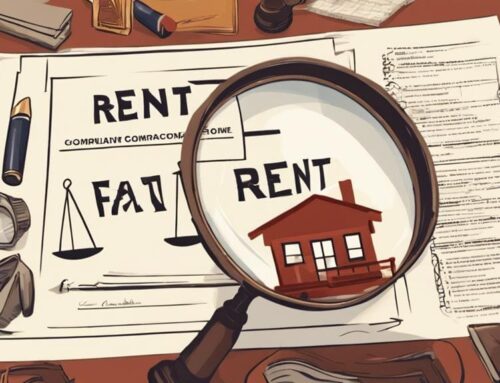To understand Texas residential eviction laws, you need to know the steps and requirements involved. Landlords must issue a written Notice to Vacate, usually giving tenants at least three days to leave. If the tenant doesn’t comply, the landlord files an eviction lawsuit in the Justice of the Peace court. Tenants have the right to contest the eviction and cannot be removed without a court order. Being aware of your rights and the proper legal procedures is essential for both parties. Further exploration reveals nuances in legal requirements and protections for tenants.
Key Takeaways
- Landlords must provide a written Notice to Vacate, granting a minimum of three days.
- Eviction proceedings require landlords to file a lawsuit in the Justice of the Peace court.
- Tenants are entitled to proper written notice before eviction and can contest it in court.
- The eviction process timeline includes notice, court hearing, judgment, and sheriff enforcement.
- Legal aid organizations and tenant rights groups offer support and assistance during eviction.
Eviction Process Overview

Understanding the eviction process in Texas is vital for both landlords and tenants to guarantee compliance with state laws and proper legal procedures. The eviction process begins with the landlord legally terminating the tenancy, which requires providing a written notice. Differentiating between termination for cause, such as nonpayment of rent or lease violations, and termination without cause is important.
For holdover tenants, a three-day notice to vacate is necessary before eviction proceedings can commence. Once the written notice has been issued and the required period has passed, landlords must file a lawsuit in the Justice of the Peace court. The court procedures involve the landlord presenting valid reasons for the eviction, ensuring strict adherence to Texas state laws.
Should the court rule in favor of the landlord, a writ of possession is issued. The writ of possession empowers the sheriff to enforce the court’s decision by removing the tenant if they haven’t vacated the premises voluntarily. The sheriff’s role is vital in guaranteeing the eviction is conducted lawfully and peacefully.
Understanding these steps ensures both landlords and tenants navigate the eviction process correctly, fostering a sense of community and legal compliance.
Legal Requirements

To comply with Texas eviction laws, you must first provide the tenant with a written notice to vacate, clearly stating the reason for eviction and allowing for a specified compliance period.
If the tenant doesn’t vacate within this period, you can then file an eviction lawsuit in the appropriate Justice of the Peace court.
Ensuring adherence to these legal requirements is essential for the lawful removal of a tenant.
Notice to Vacate
Landlords in Texas must follow legal requirements by providing tenants with a written Notice to Vacate, typically granting a minimum of three days to vacate the premises. This step is essential in the Texas eviction process to guarantee legal compliance and proper handling of the rental property under the lease agreement.
When delivering the Written Notice to Vacate, the landlord must give it in one of the following ways:
- In person: Handing the notice directly to the tenant.
- Posting: Affixing the notice to the main entry door of the rental property.
- Certified mail: Sending the notice via certified mail to the tenant’s address.
These methods ensure that the tenant is aware of the notice and the landlord remains compliant with legal requirements.
It’s worth mentioning that properties under the federal CARES Act mandate a 30-day notice before commencing eviction proceedings. Adhering to these procedures not only aligns with legal standards but also fosters a sense of belonging and respect among tenants.
Legal resources and forms are readily available to assist landlords in creating and serving a proper Notice to Vacate in Texas. Strict adherence to these steps is vital for avoiding complications in the eviction process and ensuring that the landlord’s actions remain within the bounds of the law.
Filing Eviction Lawsuit
After delivering the Notice to Vacate and the compliance period has elapsed, you must file an eviction lawsuit, known as a forcible entry and detainer suit, to legally remove the tenant in Texas. This lawsuit is filed in the Justice of the Peace court, which handles most eviction cases in the state.
To begin, make sure that the written notice you provided complies with Texas law, specifying the reason for eviction and allowing the appropriate compliance period. Once this period expires without tenant compliance, you can proceed with the lawsuit. It’s essential to adhere strictly to the legal requirements to avoid delays or dismissal of your case.
Here’s a quick overview:
| Step | Action | Requirement |
|---|---|---|
| 1 | Deliver Notice to Vacate | Written, specify reason, comply |
| 2 | Wait for Compliance Period | Varies by reason, typically 3 days |
| 3 | File Eviction Lawsuit | Justice of the Peace court |
| 4 | Serve Tenant with Court Summons | Official process server |
| 5 | Attend Court Hearing | Present evidence, await ruling |
Tenant Rights

As a tenant in Texas, you’re entitled to proper written notice before any eviction proceedings.
You also have the right to contest the eviction in court and present evidence.
Additionally, the law protects you against retaliation or discriminatory eviction practices.
Proper Eviction Notice
In Texas, tenants must receive a written notice to vacate at least 3 days before the landlord can begin the eviction process. This eviction notice is an important element of legal compliance, guaranteeing that tenants are informed transparently and fairly about their requirement to vacate. The notice must clearly specify the reason for eviction and the exact deadline.
Proper delivery methods for the notice include:
- In-person delivery
- Affixing it to the main entry door
- Sending it via certified mail
These methods aim to make certain that tenants receive the notice timely and can take appropriate actions. It’s vital for landlords to follow these methods to avoid legal complications that can arise from improper notice delivery.
As a tenant, your rights are protected under these regulations, ensuring transparency in the eviction process. You should always receive a formal written notice before facing eviction, which gives you the necessary time to respond or address the issue.
If landlords fail to provide a written notice to vacate, it can result in significant delays and legal complications in the eviction proceedings. By understanding your rights and the legal requirements, you can better navigate the complexities of eviction processes in Texas.
Contesting Eviction in Court
Challenging an eviction in court allows tenants to present valid defenses and potentially delay or prevent the eviction process. In Texas, you have the right to contest an eviction by raising defenses such as improper notice, retaliatory eviction, uninhabitable living conditions, or breaches of lease terms by the landlord. By requesting a trial, you and the landlord can present evidence, and a judge will make a decision based on that evidence.
Effective defenses can greatly impact the outcome of the trial. For example, if you can prove the property is uninhabitable or the landlord failed to provide proper notice, the court may rule in your favor. This could delay the eviction or even permit you to remain in the residence.
Additionally, legal representation can be highly beneficial. An attorney can help ensure your rights are protected and present your case more effectively.
Understanding your rights and the legal processes involved in contesting an eviction in Texas is essential. By taking informed and strategic steps, you can navigate the complexities of the residential eviction process and potentially achieve a favorable outcome in court.
Rights Against Retaliation
Under Texas law, landlords can’t retaliate against tenants for asserting their legal rights or reporting code violations. Retaliation often involves landlords taking adverse actions like raising rent, decreasing services, or initiating the eviction process in response to tenant complaints. Such actions are considered unfair practices and are strictly prohibited.
As a tenant, you have the right to challenge any retaliatory actions in court. You can seek remedies that include:
- Damages: Financial compensation for any losses you’ve incurred due to the landlord’s retaliatory actions.
- Lease Termination: The right to end your lease agreement without penalty if the landlord’s actions make living conditions untenable.
- Injunctive Relief: Court orders that require the landlord to cease the retaliatory actions immediately.
Landlords must have valid, non-retaliatory reasons for any adverse actions they take against tenants. If they don’t, you can assert your rights and safeguard yourself from these unfair practices.
Understanding and exercising these rights can help you navigate the eviction process more confidently and guarantee that you aren’t subjected to undue hardship. Always remember, the law is on your side when it comes to preventing retaliation.
Consequences of Eviction

Frequently, eviction significantly damages a tenant’s rental history, complicating future housing opportunities. When you’re evicted, it often becomes a part of your public record, visible to potential landlords. Such eviction consequences can include a tarnished rental history, which in turn makes securing future housing more challenging. Landlords are likely to view an eviction as a red flag, reducing your rental opportunities.
In addition to affecting your rental history, eviction can lead to court proceedings where landlords may seek unpaid rent and damages. These court records are public, further impacting your ability to find new housing. Understanding and exercising your tenant rights is vital to mitigate these adverse effects.
Exploring alternatives, like negotiating payment plans or entering mediation, can help you avoid the severe consequences of eviction. These options not only prevent the immediate loss of your current residence but also protect your rental history from lasting damage.
Legal Assistance

Legal assistance plays an important role in helping tenants maneuver through the complexities of eviction proceedings. In Texas, various resources are available to make sure you understand and exercise your rights under eviction laws.
Legal aid organizations provide free or low-cost assistance, offering valuable support during the eviction process. These organizations can help you understand landlord-tenant laws, ensuring you’re well-prepared for any legal challenges.
To effectively manage your situation, consider the following resources:
- Tenant rights groups: These groups offer information and support, helping you understand your rights and the eviction laws in Texas.
- Online resources: Websites and online platforms provide self-help tools and guides to assist you in navigating the eviction process independently.
- Pro bono legal services: Lawyers offering free legal representation can be vital during eviction proceedings, providing you with expert advice and advocacy.
Engaging with these resources empowers you to handle the eviction process more effectively. By leveraging the assistance of legal aid organizations, tenant rights groups, and pro bono legal services, you can maneuver through the complexities of Texas eviction laws with greater confidence.
Utilize online resources and self-help tools to stay informed and proactive in protecting your housing rights.
Eviction Timeline

In Texas, the eviction process commences with the landlord delivering a written notice to vacate, granting the tenant a minimum of three days to move out. Once this period lapses, if you haven’t vacated, the landlord can file an eviction lawsuit. You must be served with the legal papers at least six days before the court hearing, allowing you time to prepare your defense.
| Steps | Timeline | Actions Needed |
|---|---|---|
| Notice to Vacate | Minimum of 3 days | Landlord issues notice to tenant |
| Court Hearing | After 6 days of notice | Tenant receives legal papers |
| Waiting Period | 5 days post-judgment | Time before writ of possession request |
Following a court judgment favoring the landlord, a five-day waiting period ensues before they can request a writ of possession. If you choose to appeal, the appeal hearing won’t occur for at least eight days, extending the eviction timeline. Upon obtaining a final judgment, the landlord can request sheriff enforcement to remove you from the property.
Understanding the Texas Residential Eviction Laws helps you navigate the eviction timeline efficiently. Knowing each stage—written notice to vacate, eviction lawsuit, court hearing, waiting period, appeal process, final judgment, and writ of possession—ensures you’re well-prepared for each step.
Licensed Locksmith Services and Texas Law
Navigating the complexities of Texas residential eviction laws can be daunting, but having a licensed locksmith like Low Rate Locksmith Texas by your side can make the process smoother and more secure. In Texas, locksmiths must be licensed, ensuring they meet stringent state requirements for skill and reliability. Low Rate Locksmith Texas not only complies with these regulations but excels in providing top-notch security solutions.
Our certified technicians are trained to handle a variety of lock-related issues, ensuring your property remains secure throughout the eviction process. By adhering to state laws and regulations, Low Rate Locksmith Texas stands out as the best in the state, offering reliable, professional, and legal locksmith services for all your needs.
Frequently Asked Questions
What Are the Rules for Eviction in Texas?
In Texas, landlords must give you a written notice to vacate before starting the eviction process. Acceptable reasons include not paying rent or violating the lease.
You can contest the eviction in Justice of the Peace courts. If the court rules against you, a writ of possession will be issued for your removal.
Knowing your rights and responsibilities helps guarantee you navigate this process confidently and legally.
Do You Have 30 Days After an Eviction Notice in Texas?
In Texas, after receiving an eviction notice, you typically have a 3-day period to vacate if it’s due to nonpayment of rent. However, if the property falls under the CARES Act, you’ll have a 30-day notice.
For other lease violations, the notice period ranges from 3 to 7 days. Once the notice period expires, the landlord can proceed with filing an eviction lawsuit in court.
Always make sure to comply with these regulations.
How Much Notice Does a Landlord Have to Give a Tenant to Move Out in Texas?
Landlords must generally give tenants a written Notice to Vacate with a minimum of three days to move out. However, for properties under the CARES Act, a 30-day notice is mandatory.
The notice must clearly cite the reason for eviction and specify the compliance period. Proper procedure is essential, involving personal delivery, affixing to the door, or certified mail, ensuring all parties feel informed and respected.
How Long Does It Take to Evict Someone From Your Home in Texas?
The eviction process in Texas typically takes about 3-4 weeks. After serving a notice to vacate, tenants have 3 days to leave.
Court hearings occur within 10-14 days post-filing by the landlord. If the tenant appeals, the process may extend by another 30-90 days.
The actual timeline can vary due to individual circumstances and court backlogs, but this general timeframe helps you plan accordingly.
Conclusion
Traversing Texas residential eviction laws can feel like maneuvering a maze. You must understand the eviction process, legal requirements, and tenant rights to avoid pitfalls.
Picture the consequences of eviction looming like storm clouds, underscoring the need for timely legal assistance. The eviction timeline ticks away like a countdown, creating urgency.
By mastering these elements, you can better protect your rights and make informed decisions, ensuring smoother sailing through turbulent legal waters.









